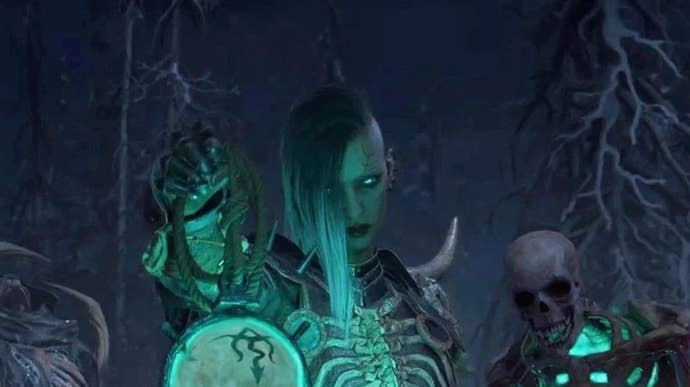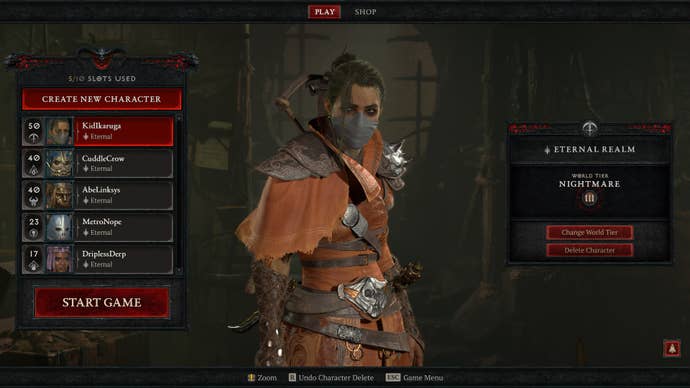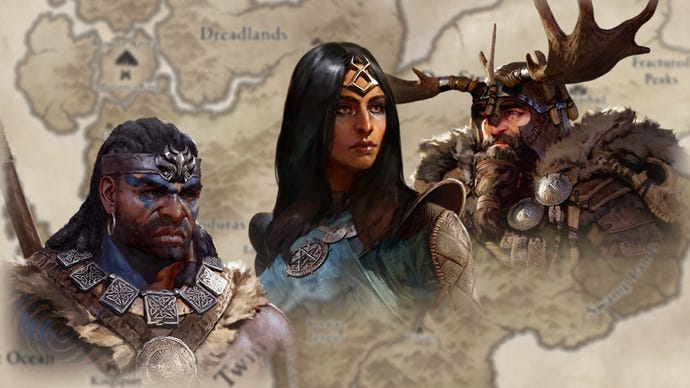I can’t stop playing Diablo 4, and it’s all because of its exquisite build crafting and engrossing map design
Whether you're playing as a Rogue, Necromancer, Druid, Barbarian or Sorcerer - Diablo 4’s gameplay is simply too good.
It’s always, always a good sign when a game feels so good that you want to spend as much time playing it as you can. But an even bigger sign that you’re hooked is when you feel compelled to try things you wouldn’t do in a similar game; play classes you tend to skip, or build around certain roles that you never thought were exciting.
I’ve seen this before in Elden Ring, a game that convinced plenty of players to try magic. I’ve certainly found myself playing as casters far more often than previous FromSoftware games, and that’s saying a lot considering how much I play them.
But my latest obsession is Diablo 4, which isn’t itself a surprise if you know me. But I’m more taken aback by how many of the game’s classes and playstyles I continue to experiment with.
In the vast majority of the ARPGs I play, my first character is always the warrior/barbarian type: full-on aggression, in the thick of it, melee over everything else. I find it much easier to appreciate the nuances of a game’s combat, the reactivity of its world, the heft of animations (and ragdolls), and its general physics engine when I play as a warrior.
Even after I finish the game as that class, I’m usually more inclined to either explore new builds for the same class (or put the game down entirely). It took me literally years to create a Wizard in Diablo 3, and that didn’t even come until I messed around with the Demon Hunter for a bit. Before that, it was Barbarians, and Crusaders.
We’re only over a week into the life of Diablo 4, and I have already played as every single class in the game. Technically, I’d been playing the game for longer than most because of the review period, but the point still stands. I finished the campaign as a Druid pre-release, and as a Rogue after it came out. I’ve since reached level 40 with a bleed-focused Barbarian, level 40 with an Ice and shock Sorcerer, and more recently level 23 with a blood-stealing Necromancer.

Diablo 4’s action combat simply feels satisfying to play no matter which class you choose. When picking a different class from what I’m used to, I found it illuminating to be able to experience the game in new ways and appreciate the action I crave from a different perspective.
When bolts of lightning, ice shards, and arrows feel as chunky when they hit as my hammer slam, you bet I’m going to be sticking around far longer with each class than I thought.
But there’s another, equally crucial reason why no class feels bad to play in Diablo 4. Each class is effectively a tree, and you can dictate how it branches. I don’t like pet classes in ARPGs, so my Necromancer is basically a death wizard. There are clear paths you can go down that offer you different options if you sacrifice your ability to summon corpses.
When I finished the game as a Druid, I did not spec a single point into shapeshifting skills. My Druid was a stormcaller, a nature magic wielder. Rogues are likewise adept at being mini Demon Hunters – obliterating most things from a distance with their rain of arrows, or agile close-quarter fights that deliver impressive damage very quickly, but also need to constantly stay on the move because of their lack of defence.
Then there are Barbarians, who perhaps have the most most complex level of character building. Because of how much you can customise your loadout as a Barbarian, you can lean on certain damage types and align them with the skills you prefer. For instance, an overhead strike could be a helmsplitter with a sharp weapon, or deliver a ground pound with a blunt weapon.

A big part of why roaming Diablo 4’s world is compelling is just how distinct its different regions are. It’s a joy to see how Blizzard applied its material-based lighting to rocky, arid deserts as it was to cut through the snow in the early hours.
Even by the end of the campaign, you’re not going to see a significant portion of that world, so there’s always something to see on future characters. Beyond its looks, each area contributes to the enemy variety, either by having completely new enemies, or thematically appropriate factions of existing ones.
The ability to climb up walls, roll down hills and jump gaps adds a layer of verticality to what would otherwise be a flat open world. I’m genuinely intrigued to see what’s around every corner, something only really FromSoftware games do for me.
It’s almost like Blizzard knew more players would be encouraged to try classes they’re not familiar with in Diablo 4 compared to its earlier games. The game is designed to speed up the way you play future characters once you finish the campaign once.
Your horse is available for all future characters once any of them unlock it, meaning you can start roaming early and much faster. If you spent time going after Lilith Altars in the game’s various regions, any character in that region immediately starts with extra skill points, more healing potion capacity and other boosts.
And, if you decided to take things slow for your first go by sticking to World Tier 1, your familiarity with the game easily makes starting out future characters at World Tier 2 a much easier pill to swallow – which itself means they’ll be climbing up the ranks much quicker.
This all bodes well for future seasons/seasonal content. If I’m having this much fun right now, I imagine I’m not going to mind starting a seasonal character and experimenting with a different build and join the race.
Check out our beginner's guide to Diablo 4 if you need a hand getting your first character off the ground in Diablo 4.








